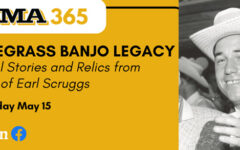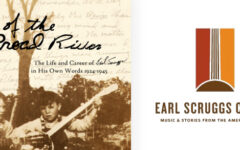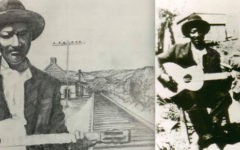
Frank D Ray, leader of the Ozark bluegrass band Cedar Hill, has been named as the 2019 SPBGMA Hall of Greats inductee.
He has been playing in bluegrass bands since 1964. The mandolin player for the group, he sings the lead, tenor, and the high baritone parts. A veteran songwriter, he has written many outstanding songs and instrumentals over the years that have earned him several Song Writer of the Year Awards, and in August 2008 he was inducted into America’s Old Time Country Music Hall of Fame.
2018 has been a particularly big year for news of honors for Frank Ray.
Ray was typically unassuming when learning of the SPBGMA award….
“It truly is an unexpected honor that I am both grateful for but very humbled by. This has been quite a bluegrass year with the Lifetime Achievement Award from NTCMA (National Traditional Country Music Association) in September.
I received a call from the SPBGMA Secretary, Stephanie Jones, informing me that I had been selected for induction into the Hall of Greats at their Nashville convention February 1-3, 2019. I was truly taken by surprise. I personally do not feel worthy of the recognition when I am aware of so many greats that have gone before me. Many who I have gleaned from over the years. I feel the important thing for me is to keep a solid awareness of my weakness/frailties and how much I feel I fall short. I suppose the rest is far better left to others to decide.”
Missouri bluegrass music expert CJ Lewendowski, of The Po’ Ramblin’ Boys, provided this excellent biography…
Frank Dallas Ray was born on Christmas Eve 1946, the second child of Dallas and Bertha Ray, a family with deep roots in the Missouri Ozarks. They were settled in Hartshorn, a small community just outside of Summersville, Missouri. Frank recalls his first encounter with music being a wind-up Victrola at home that the family’s three records were played on; Jimmy Rodgers, Hank Williams, and Bill Monroe. Saturday nights, they tuned in to the distant Grand Ole Opry.
Dallas, Frank’s father, loved music and sang while playing guitar and harmonica. Frank’s grandfather, Frank Newton Ray played fiddle and would often travel the countryside playing square dances. That caused the seven-year old Frank to pick up the guitar and learn to accompany his father as he sang and played. Learning proficiently at a young age, Frank started backing area square dance fiddlers, such as Ansil Gore. As most teenagers of the time, though, he was drawn by the electric sounds of rock & roll music for a brief time but, was soon bitten by the bluegrass bug once again.
By 1963, Frank had developed an interest in banjo, but soon laid it down for the mandolin. This would be the instrument Frank would be known for from that point on.
On July 15, 1964, Frank married the love of his life, Miss Vicki. They would go on to have four children, ten grandchildren and 12 great grandchildren. Frank and his Uncle Richard Orchard had begun playing music together around this time, and by 1967 Rich Orchard, Frank Ray, and The Ramblin’ Blue Grass Boys had formed. The band began playing local and regional venues, helped to form the Missouri Area Bluegrass Committee, and became one of the prominent acts in the early times of Missouri bluegrass. This band can be heard on a 1970 Trepur 45 rpm record with Bob and Stan Wagganer on twin fiddles. Frank’s iconic tenor is prevalent even in these early recordings.
As The Ramblin’ Blue Grass Boys became more popular in the Midwest, bluegrass music was changing in a more progressive manner, and Frank felt the need for a new band name. He didn’t know what to call it, though. While playing a show in Cedar Hill, Missouri in 1972, Jimmy Bunch’s banjo fell out of his case into the grass. With Frank’s remark of ‘at least you’re taking some Cedar Hill Grass home with you,’ The Cedar Hill Grass was born. One recording from 1974 captures Frank’s first recorded original, Piney Ridge. By 1976, Rich Orchard had left the band and Frank became the sole leader of The Cedar Hill Grass. That same year, their first 33 1/3 LP album was recorded titled Cedar Hill Express, after the title cut instrumental written by Frank and Jim Bunch. From that album False Hearted Love became the first song of Frank’s originals to win accolades and nationwide attention.
The Cedar Hill Grass became a top bluegrass band in the 1970s and 1980s in the Midwest Bluegrass scene, along with homing in on the sound that Frank was searching for. Original traditional material with a touch of new feel. Frank’s mandolin playing infused innovation and Monroe. The band’s arrangements were precisely thought out and always showcasing stellar vocals and the stories of the songs.
By the late 1970s, the word ‘Grass’ was dropped from their name and they became known as Cedar Hill. Recording with Rich R Tone Records, Hay Holler Records, and Blue Circle Records, some of Cedar Hill’s most iconic songs were captured. Pearl’s Song, Echo Mountain, Blood Stained Bible, Ice on The Timber, Hobo’s Wings, For Me It’s Hello…. the list goes on and on. Story songs. Real songs. Music that makes you feel. That is Frank Ray and Cedar Hill. Original traditional Ozark bluegrass music.
From a little Ozark town to England to the Grand Ole Opry, Frank Ray has taken a music that is truly his own everywhere in the world. In 2008, Frank was inducted into the National Traditional Country Music Association Hall of Fame and also received the Association’s Lifetime Achievement Award in 2018.
As it’s known today, Frank Ray and Cedar Hill has celebrated over 50 years of Ozark bluegrass music. Always staying true to his roots, Frank carries stories and songs that people all over the world have enjoyed. This connection to his roots can be heard on the 1991 Missouri Sessions as Frank sings with his mentor, Don Brown, on Where We’ll Never Die. Frank has become the Ambassador of Ozark bluegrass music, a disciple of Bill Monroe, and a treasure to the bluegrass music industry.
Cedar Hill has played a number of places in England, Wales, Ireland, Scotland, and Canada. “I have played Omagh two or maybe three times. Multiple times in Wales as well. We were the first American group to play the Swansea Festival for Roland Emmanuel on the beautiful Gower Peninsula,” Ray adds favorably.
As he has mentioned, not only is he being honored by the SPBGMA, his many contributions to the furtherance of bluegrass music have been recognised in September by the National Traditional Country Music Association.
However, for Ray the tributes don’t end there, as he is to be recognized as a Pioneer of Missouri Bluegrass by the Missouri Bluegrass Preservation Association, at The MABC Winter Bluegrass Festival, Holiday Inn, Six Flags, Eureka, Missouri, on January 4, 2019.
The SPBGMA honor will be bestowed at the 45th Annual SPBGMA Bluegrass Music Awards & 36th National Convention & Band Championship, taking place at the Sheraton Music City Hotel, Nashville, Tennessee, during the weekend of February 1-3, 2019.
Well done, Frank Ray.
A Discography
Rich Orchard, Frank Ray & The Ramblin’ Blue Grass Boys –
- Roll in My Sweet Baby’s Arms / New Orange Blossom Special (Trepur 1025, 1970)
Cedar Hill –
- A Journey of Faith (Rich-R-Tone NR 21235, 2002)
- A Home Made for Me (Rich-R-Tone no # – 2003)
- Stories (Hay Holler HHH-CD-1369, 2004)
- Portrait of A Song: The Drasco Sessions (Hay Holler HHH-CD-1377, 2006)
- Poverty Row (Blue Circle BCR-011, 2007)
- Looking Back (Scena 7220, 2008)
- I’ve Got A Thing About Doors (Blue Circle BCR-026, 2011)
- Miss Dixie, Tom T. And Me (Blue Circle BCR 042, 2015)
- By Request Volume 1, A 50-Year Tradition (Nickletown NR 170515, 2017), a collection of new recordings with the current Cedar Hill line-up. The material is previously chart or most requested songs that were hitherto no longer available.
- Write Bill a Letter (Nickletown single, 2018)
Frank Ray & Cedar Hill –
- 33 Years (No label 2000)
Cedar Hill are Frank Ray (mandolin, vocals); Jim Bunch (banjo, vocals); Pete Brown (fiddle); Patti LaFleur (bass, vocals); and Dan Stokely (guitar, vocals)







